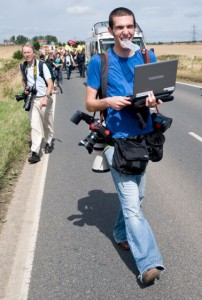Phew. I’m back, after a Christmas break in which my immune system saw fit to relax and welcome in a stinking cold, thwarting any grand plans I might have had about coming up with irresistible feature ideas, sorting out my contacts book and getting my accounts in order.
It was almost like the cumulative mental stresses and strains of 2008 congested in my head only to be blown out with gusto as 2009 arrived. Which brings me onto my next point – Happy New Year.
Ah, New Year, a time for reflection, reinvention, and of course, New Year’s resolutions. This time last year I was resenting being back at work – now (like many people in this country) I’m thankful to have any work at all.
So, as I dust off the last of the mince pie crumbs and attempt to wean my body off regular doses of red wine, cold turkey, Quality Street and every other kind of oral fixation I seem to have developed whist watching re-runs of Home Alone and the Antiques Roadshow, here are my top five, ever-so-slightly over-ambitious but necessary New Year’s, New Freelancer’s Resolutions / Commandments:
1. Thou shalt stop procrastinating. Any time I feel inexplicably compelled to tune into 80s videos (read: Foreigner, Toto and Chris De Burgh) on YouTube, or sneak into the kitchen to prepare a strangely frugal yet hybrid snack made from the collective ingredients of my kitchen cupboards, I will resist. I will use spare time wisely: chasing invoices, brainstorming ideas, reading other features and researching. Twittering however, and other genuine modes of online networking, will be self-permitted and encouraged.
2. Thou shalt aim high. I must remember that my experience, expertise and capability are precious – and will not be tempted to sell myself short or write for free. Because thou is worth it, right?
3. Thou shalt be more persistent. I will make sure I’m being proactive about pitching and will not be afraid to bang on doors – everyone else is doing it, after all.
4. Thou shalt diversify and leave thy comfort zone. Surely there is money to be made writing about all sorts of esoteric subjects I haven’t thought of yet?
5 Thou shalt blog, like there’s no bloggin’ tomorrow. Because it’s quick, effective, a great way of joining the debate and networking. I’ll be one of those bloggers with a book deal before I know it…
So, I’ll keep you updated as to how I get on with those – and why don’t you share any you might have with me? Right, I’m off to Dubai for ten days in an attempt to mix pleasure with work. Tune in next time to find out how I got on…
Rosie Birkett is a freelance journalist and sub-editor who specialises in food, hospitality and travel. She can be contacted on rosiebirkett1 at hotmail.com. She also blogs at thelondonword.com and at fiftyfourfoodmiles.wordpress.com. You can follow the series ‘Mad to start freelancing in the recession?’ series here here.
